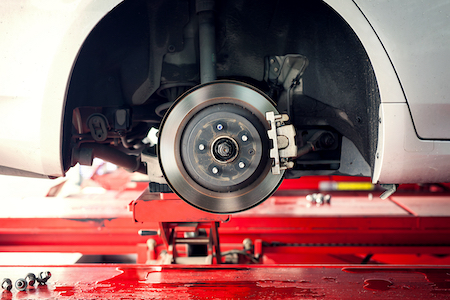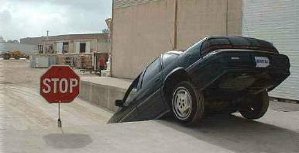Imagine heading up into the mountains for a day of skiing. You drive deeper into the hills, closer to your destination on snow-packed roads. Suddenly, as you tap your brakes, it feels a bit squishy. Almost as if the brakes aren’t there. You tap again. Something’s not right.
Will you be able to bring your car to a stop?
Will you trust your brakes on the ride home?
That’s the last thing you want to have happen on your fun-filled day trip. Luckily, a little TLC and regular maintenance can prevent that from happening.
Your brakes won’t fail without advanced warning. Your brakes will give you ample notice to bring your vehicle in for servicing long before it creates a problem.
What should you watch for?
Squealing or grinding noise
One of the most common indicators of brake problems starts when you apply pressure to the brake pedal. If you hear a high-pitched squeal, this could indicate wear on the brake pad. Brake pads are made with a steel indicator band to let you know they’re reaching end-of-life. This metal band connects with the rotor as you apply pressure, and the metal-on-metal creates a distinctive sound. If you keep driving once you notice this sound, the metal will wear into the rotor, causing additional problems that will be even more costly to fix.
A grinding noise could indicate different things. Are your brakes fairly new? The grinding sound could be something like gravel stuck in the brake calipers. Or if the brake pads have worn down to the metal indicator bar, it could be the metal-on-metal sound.

Vibration when braking
As you drive, you grow accustomed to the way your car handles. If you notice a change in performance, pay attention to what is occurring. This can help a mechanic get to the heart of the problem.
If your steering wheel or vehicle shakes or vibrates when you apply pressure to the brake pedal, it might be an indicator of a problem with the brake rotor. The brake rotor is a large disc that sits just inside the wheel. When you apply pressure to the brake pedal, the brake pad presses against the brake rotor to bring the car safely to a stop.
Over time, the rotor surface can change. Material from the pad can cause divots and uneven wear marks. If the brake pads wear down to the metal bar, that can also cause irregular wear marks on the rotor. This unevenness affects the stopping power when you press down on the brake pedal. Brake servicing can fix uneven brake rotors, smoothing down the surface, providing it’s not too worn to fix. If the divots and worn marks are too severe, you’ll have to replace the brake rotors.
Leaking fluid
Like other systems in your vehicle, the brake system uses brake fluid for proper performance. When you apply the brakes, the system uses brake fluid to create hydraulic pressure against the brake caliper. If the braking system is low on brake fluid, the pressure won’t be there to control your vehicle.
If you experience a soft brake pedal, it’s time to bring your vehicle in for an inspection. They can check to ensure brake fluid isn’t leaking from the master cylinder or elsewhere in the brake system.
You can also check your owner’s manual for guidelines on how often brake fluid should be checked and serviced. While it doesn’t need replacing like motor oil, fluid can be compromised over time.
Spongy brake pedal
When we drive, almost every aspect becomes automatic, second nature, because the car behaves in a certain way. When you notice differences, it’s time to take action.
A brake pedal provides certain resistance as you push down, and hydraulics kick into action. If the brakes feel softer as you press it further to the floor, it’s time for immediate service. It’s an indicator of moisture or air in the braking system, or a problem with the master cylinder.
Car pulling to one side
A vehicle contains four wheels, four brake pads, and four calipers. In a perfect world, all four would wear similarly. However, that’s rarely the case. If one caliper wears differently, or a brake hose goes bad, it can cause more pressure on one wheel. You’ll notice that in your car’s behavior.
With more pressure on one side, the stopping power will be uneven. You’ll notice the car pulling to one side or the other. This will only get more pronounced if left unchecked.
Burning smell
A sharp burning smell after continually using your brakes is an indicator of overheating brakes. Pull over and give your brakes a chance to cool down. You can also further assess the situation.
Check the parking brake. Is it fully released?
If you see smoke coming from one of the wheel wells, it could be a sign of a stuck brake caliper. If it’s stuck in place, your vehicle is no longer safe to drive. You may have to tow it in for repair.
Brake light turns on
One of the good things today’s cars offer is technological advancements that can alert you to potential problems. Your dashboard panel has a variety of lights and indicators to help you decide when to service your car. When you see the brake light illuminate, it’s time to bring your vehicle in for an inspection.
In some cases, a brake light can be an indicator that your parking brake is on. Check to see if the parking brake is engaged. With that fully released, it’s time to schedule a maintenance visit if the brake light is still on.
Do you have brake problems?
Your brake system is one of your vehicle’s most important systems. Without brakes, you put yourself and those around you at risk.
Think you may have brake problems? Make an appointment today. We’ll get you safely back on the road.

